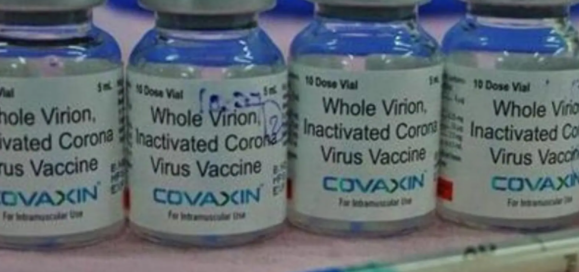Virendra Pandit
New Delhi: While the World Health Organization (WHO) has warned of an additional 700,000 deaths because of surging Delta variant in the Covid-19 afflicted Europe by March 2022, and Germany has observed even fully vaccinated people infected afresh, The Lancet Infectious Diseases Journal has said the two doses of Covaxin are 50 percent effective against the symptomatic disease.
According to the first real-world assessment of India’s indigenous Covid-19 vaccine, the two doses of Covaxin, also known as BBV152, had 77.8 percent efficacy against symptomatic disease and present no serious safety concerns, the media reported on Wednesday.
The latest study assessed 2,714 hospital workers at All India Institute of Medical Sciences (AIIMS), New Delhi, from April 15–May 15, who were symptomatic and underwent RT-PCR test for Covid-19 detection as the second deadly pandemic wave swept the country. Researchers found that the Delta variant was the dominant strain in India during the study period, accounting for nearly 80 percent of all confirmed pandemic cases.
Delta has since reached China, Europe, and other areas as well, prompting the WHO’s latest warning.
Covaxin, developed by Hyderabad-based Bharat Biotech International Ltd (BBIL), jointly with the National Institute of Virology-Indian Council of Medical Research (NIV-ICMR), Pune, is an inactivated whole virus vaccine administered in a two-dose regimen, 28 days apart.
In January, the Centre had approved Covaxin for emergency use in India for people aged 18 and above. Early in November, the WHO added it to its list of approved emergency use of Covid-19 vaccines.
They conducted the latest study during India’s second Covid-19 wave and among healthcare workers primarily vaccinated with Covaxin in the first phase of the nationwide inoculation drive.
“Our study offers a more complete picture of how BBV152 (Covaxin) performs in the field and should be considered in the context of Covid-19 surge conditions in India, combined with the possible immune evasive potential of the Delta variant,” said Dr. Manish Soneja, Additional Professor of Medicine at AIIMS.
“Our findings add to the growing body of evidence that rapid vaccine rollout programs remain the most promising path to pandemic control while public health policies must continue to include additional protective measures, such as mask-wearing and social distancing,” he said in a statement.
The vaccination centre at AIIMS had exclusively offered Covaxin, beginning January 16 this year, to all of its nearly 23,000 employees.
Of the 2,714 employees in the study population, 1,617 had tested positive for SARS-CoV-2 infection, the virus that causes Covid-19, and 1,097 tested negative.
The study found that the vaccine effectiveness against symptomatic cases after two doses of Covaxin with the second dose administered 14 or more days before undergoing RT-PCR testing was 50 percent. The effectiveness of two vaccine doses remained stable over the seven-week follow-up period, the researchers said.
“Findings from the study confirm previous research indicating that two doses of BBV152 are required to achieve maximum protection and that all vaccine roll-out plans must follow the recommended dosing schedule,” said Dr. Parul Kodan, Assistant Professor of Medicine at AIIMS.
They acknowledged that the Covaxin effectiveness estimated in this study is lower than the efficacy reported by the recently published phase 3 trial. This study population only included hospital employees who may have a higher risk of exposure to Covid-19 infection than the general population.
The prevalence of circulating variants of concern, especially Delta, may have also contributed to the vaccine’s lower effectiveness.

